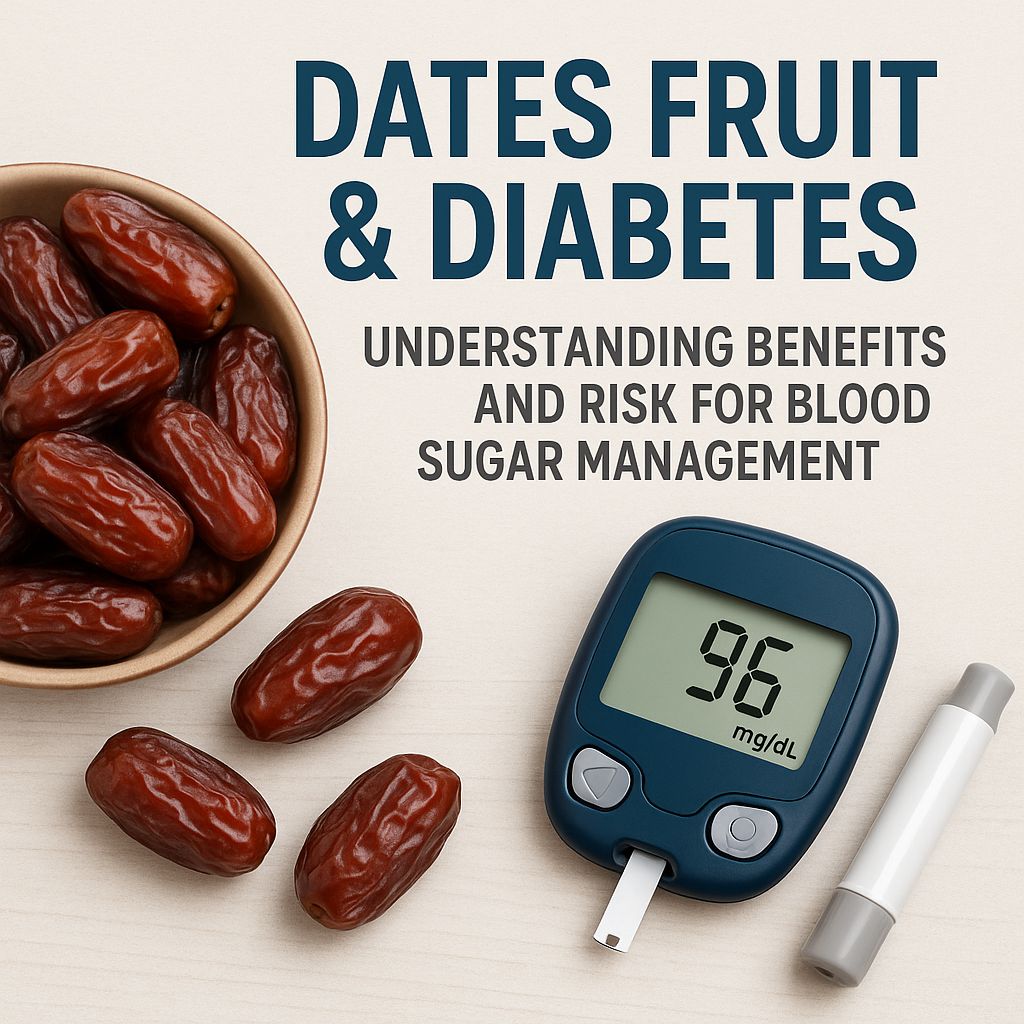Dates are a sweet fruit often questioned by people with diabetes because of their natural sugar content. They can be safely eaten in small amounts since their fiber and fructose help keep blood sugar levels more stable than other sugary foods. This makes dates a possible treat for those managing diabetes when consumed with care.

Research shows that eating one to three dates at a time does not cause major spikes in blood glucose. However, individuals should still monitor their blood sugar and talk to a healthcare professional before adding dates regularly to their diet. The natural fiber in dates slows sugar absorption, which can benefit blood sugar control.
Understanding how dates affect blood sugar and knowing the right portions can help people with diabetes enjoy their flavor without negative effects. It is important to balance dates with a healthy diet and to consider personal blood sugar responses.
Key Takeways
- Small servings of dates are generally safe for people with diabetes.
- Dates contain fiber and fructose that help slow blood sugar rise.
- Monitoring blood sugar and consulting a doctor is important before adding dates to the diet.
Understanding Dates Fruit

Dates are a fruit with balanced nutrients and natural sugars. They come in different varieties and can be eaten fresh or dried. Knowing the nutritional content, types, and how to consume them helps people, including those with diabetes, make informed choices.
Nutritional Profile of Dates
Dates contain mainly carbohydrates, mostly in the form of natural sugars like glucose and fructose. A typical serving of 3 to 5 dates has about 60 to 80 grams of carbohydrates. They are also a good source of dietary fiber, which helps slow sugar absorption.
Besides carbs, dates provide small amounts of protein and fat. They offer minerals such as potassium, magnesium, and iron. Dates also contain vitamins like B6 and antioxidants that support general health.
The glycemic index (GI) of dates is low to moderate, meaning they cause a slower rise in blood sugar when eaten in reasonable amounts.
Types of Dates
There are several types of dates, each with a different taste, texture, and color. Common varieties include:
- Medjool: Large, soft, and sweet with a rich flavor. Often eaten fresh or used in desserts.
- Deglet Noor: Medium-sized with a firm texture and mild sweetness. Often dried and used in cooking.
- Barhi: Smaller, softer, and very sweet, eaten fresh or dried.
Fresh dates tend to have higher moisture and softer texture. Dried dates have less water and a more concentrated sweetness. The type of date affects how people use them in meals or snacks.
Serving Sizes and Consumption Methods
A typical serving size for dates is about 2 to 3 medium dates or 30 to 40 grams. This amount provides energy but should be balanced with other foods.
Dates can be eaten fresh or dried, alone or added to dishes like cereals, salads, or smoothies. Some use dates as natural sweeteners in recipes instead of sugar.
Moderation is key because dates contain natural sugars that, in excess, can raise blood glucose levels. Eating multiple servings at once may cause blood sugar spikes, especially in people with diabetes.
For safe intake, 2 to 3 dates per day is often recommended for those managing blood sugar, but individual needs vary.
Diabetes Overview

Diabetes affects how the body handles blood sugar, which is vital for energy. The condition involves changes in insulin, the hormone that controls sugar levels. Understanding the types of diabetes and how blood sugar is regulated helps explain its impact on health.
Types of Diabetes
There are three main types of diabetes: type 1, type 2, and gestational diabetes.
- Type 1 usually starts in childhood or adolescence. The body cannot produce insulin because the immune system attacks insulin-making cells.
- Type 2 is the most common. The body does not use insulin well or may not make enough. It often develops in adults but can occur in younger people too.
- Gestational diabetes happens during pregnancy and usually goes away after birth but increases the risk of type 2 later.
Each type affects blood sugar control differently and requires specific management.
Blood Sugar Regulation
Blood sugar, or glucose, comes from the food people eat. Insulin helps cells absorb glucose for energy or storage.
When blood sugar is high, the pancreas releases insulin to lower it. If insulin is low or cells resist it, sugar builds up in the blood, causing hyperglycemia.
The body needs a balance; too much sugar can damage organs, while too little causes low energy and weakness.
Effective regulation depends on insulin production, sensitivity, and how the body processes carbohydrates from food.
Impact of Dates on Blood Sugar Levels

Dates contain natural sugars that affect blood sugar differently depending on how they are consumed and the individual’s health. Understanding the glycemic index, glycemic load, and both short- and long-term effects helps people with diabetes manage their diet better.
Glycemic Index of Dates
The glycemic index (GI) measures how quickly a food raises blood sugar. Dates have a medium GI, usually between 40 and 60. This means they cause a moderate increase in blood glucose compared to high-GI foods like white bread.
Different types of dates vary in GI due to sugar content and ripeness. For example, fresh dates typically have a lower GI than dried ones. Eating dates with fiber or protein can also slow glucose absorption, reducing spikes.
Knowing the GI helps people with diabetes include dates in their diet without causing sharp blood sugar rises.
Glycemic Load Considerations
Glycemic load (GL) looks at both the GI and the amount of carbohydrates in a serving. Dates have a moderate GL, usually around 15 per 3-4 dates.
This means eating a small portion of dates leads to a manageable effect on blood sugar. Larger portions increase the GL and can raise blood sugar more.
People with diabetes can benefit from measuring portion size when eating dates. Limiting intake to a few dates per serving can help maintain better glycemic control.
Short-Term and Long-Term Effects
Short-term studies show that eating 7–10 dates does not cause significant blood sugar spikes for people with diabetes. This suggests dates can be part of a controlled diet without immediate harm.
Long-term effects are less certain due to limited research. However, some studies indicate dates may help improve lipid profiles and reduce cholesterol, which supports heart health in diabetes.
Despite these benefits, consistent portion control is crucial. Dates should not replace medication or other prescribed treatments for blood sugar management.
For more detailed information on glycemic control with dates, see research on their effects on blood glucose and their impact on metabolic variables.
Benefits of Dates for People With Diabetes
Dates provide several key nutritional advantages that can support blood sugar control and overall health in people with diabetes. Their unique components help with digestion, reduce inflammation, and contribute important vitamins and minerals.
Fiber Content and Satiety
Dates have a high fiber content, which is important for slowing down sugar absorption into the bloodstream. Soluble fiber in dates helps reduce blood sugar spikes after meals by controlling digestion speed.
The fiber also promotes a feeling of fullness, which can help prevent overeating. This effect is useful for managing weight, a crucial factor in diabetes care.
Eating dates in moderation can contribute to better appetite control and steady energy levels throughout the day. This helps people with diabetes avoid rapid changes in blood sugar.
Antioxidant Properties
Dates contain antioxidants such as flavonoids, carotenoids, and phenolic acid. These compounds help reduce oxidative stress, which is often higher in people with diabetes.
Lowering oxidative stress can help reduce the risk of diabetes complications like heart disease and nerve damage. Antioxidants also support overall inflammation control.
Including dates as part of a balanced diet may assist in protecting cells and improving long-term health outcomes for people with diabetes.
Micronutrients Relevant to Diabetes Management
Dates provide essential vitamins and minerals that benefit those with diabetes. They are a good source of potassium, which helps regulate blood pressure, often a concern in diabetes.
They also contain magnesium, known to improve insulin sensitivity and help control blood glucose levels.
Other micronutrients in dates include vitamin B6 and iron, which support metabolism and prevent anemia, common issues in diabetes.
These nutrients make dates a valuable option for supporting specific health needs related to diabetes. For more detailed study, see studies on the effects of dates on blood glucose.
Risks and Precautions When Consuming Dates
Dates contain natural sugars that may affect blood sugar levels. Managing how many dates to eat and being aware of possible effects on medications is important for people with diabetes.
Portion Control Guidance
Eating dates in moderation is critical for blood sugar control. Most experts recommend limiting intake to two or three dates per day. Each date contains around 20 calories and 4-5 grams of sugar, which can add up quickly.
Overeating dates can increase calorie intake and lead to higher blood glucose levels. It is best to spread consumption throughout the day rather than eating many at once. Monitoring blood sugar after eating dates helps identify personal tolerance.
People with diabetes should balance dates with other foods that have fiber or protein to reduce sugar absorption. Fresh dates generally affect blood sugar less than large amounts of dried dates.
Potential Blood Sugar Spikes
Dates have a low to moderate glycemic index, meaning they raise blood sugar slower than some other sweets. However, their high sugar content can still cause spikes if eaten in excess.
Blood sugar spikes risk is higher if dates are eaten on an empty stomach or in large portions. It is important to test glucose levels regularly after eating dates to see individual effects.
Combining dates with meals that contain fats or protein may blunt blood sugar rises. Some studies show moderate consumption of dates may improve blood glucose and lipid profiles, but careful monitoring is needed.
Interactions With Diabetes Medications
Dates may affect how diabetes medications work due to their sugar content. High sugar intake can reduce the effectiveness of insulin or oral drugs.
People taking medications should watch for signs of elevated blood sugar when adding dates to their diet. Adjustments to medication might be needed under medical supervision.
Always consult a healthcare provider before making dietary changes involving dates. This is especially important when on insulin or drugs that affect blood sugar to avoid harmful spikes or drops.
For more on this topic, see the article on dates’ effects on blood sugar by Medical News Today here.
Healthy Ways to Incorporate Dates Into a Diabetic Diet
Dates can be part of a diabetic diet when eaten in proper portions. Pairing them with proteins or healthy fats helps control blood sugar spikes. Timing and recipe choices also affect how the body handles the natural sugars in dates.
Recipe Ideas and Substitutions
Combining dates with foods rich in protein or healthy fats slows sugar absorption. For example, stuffing dates with nuts like almonds or walnuts creates a balanced snack.
Using dates as a natural sweetener in recipes can replace sugar without causing a sharp blood sugar rise. Recipes like smoothies with dates, yogurt, and chia seeds make a good mix of fiber and healthy fats.
For baking, substituting dates paste for sugar reduces the glycemic load. Small portions of date-based energy balls mixed with seeds and protein powder also work well for a controlled treat.
Best Time to Eat Dates
Eating dates with meals is better than alone. The extra fiber and protein in meals slow down sugar release.
Dates make a quick source of energy before or after exercise, helping maintain blood glucose levels.
People with diabetes should avoid eating many dates at once or late at night. Spreading out small servings throughout the day prevents sudden blood sugar spikes and helps maintain stable levels.
For personalized timing, consulting a healthcare provider is advised to match individual blood sugar patterns.
More about dates’ effects on blood sugar
Research and Expert Recommendations
Dates can be included in a diabetic diet without causing major blood sugar spikes when eaten in moderate amounts. Experts point out the importance of portion control and pairing dates with other foods to manage carbohydrate impact.
Findings From Recent Studies
Studies show that consuming two to three servings of dates daily may benefit people with diabetes due to the fruit’s fiber and natural sugars. Dates have a low glycemic index (GI), which means they cause a slower rise in blood glucose levels compared to other sweet foods.
Research also notes that dates contain fructose, which has less effect on blood sugar compared to glucose. Some studies report no significant change or impairment in blood sugar control when dates are included in the diet, but more research is needed because some findings have limitations. For details, see this study on the effect of dates on blood glucose.
Dietitian and Healthcare Perspectives
Dietitians often recommend eating dates with protein or healthy fats, like nuts. This helps slow digestion and blood sugar spikes. Many healthcare professionals agree that dates are safe for most people with diabetes if eaten in small amounts.
Portion size is key; two to three dates are commonly suggested per day. Some emphasize monitoring individual blood sugar response since people may react differently. Healthcare providers encourage combining dates with balanced meals rather than eating them alone, ensuring better glucose control. More guidance can be found in Healthline’s article on dates and diabetes.
Frequently Asked Questions
Dates have natural sugars but a relatively low glycemic index, which means they raise blood sugar levels more slowly than some other sweet foods. Portion control is important to prevent blood sugar spikes. Different types of dates may vary slightly in sugar content and how they affect blood sugar.
How can dates impact blood sugar levels in diabetics?
Dates contain natural sugars that can increase blood sugar. However, their low to medium glycemic index means they cause a slower rise in blood sugar compared to high GI foods. Eating dates in moderation helps avoid sudden blood sugar spikes.
What is the recommended daily intake of dates for someone with diabetes?
People with diabetes should limit their intake to a small portion, such as 2 to 3 dates per day. Keeping the portion controlled helps manage blood sugar while still benefiting from the fiber and nutrients in dates.
Are there any particular varieties of dates that are more suitable for diabetics?
Some varieties like Medjool and Deglet Noor differ slightly in sugar levels, but no specific variety is strictly better for diabetes. Portion size and overall diet matter more than the variety chosen.
What is the glycemic index of Medjool dates and how does it affect diabetes management?
Medjool dates have a glycemic index between 44 and 53, which is considered low to moderate. This means they cause a gradual increase in blood sugar, making them generally safer for people managing diabetes when eaten in controlled amounts.
Can eating dates have any side effects for individuals with diabetes?
Eating too many dates can lead to blood sugar spikes. A rare condition called hereditary fructose intolerance means some individuals must avoid dates completely, but this is uncommon. Most people with diabetes tolerate moderate amounts without serious side effects.
How do the sugars in dates compare to other sweet fruits for diabetes control?
Dates have more concentrated natural sugars than many fruits, but their fiber content slows sugar absorption. Compared to fruits like grapes or bananas, dates have a lower glycemic index, causing a slower blood sugar rise when eaten in small amounts. For more details see Are dates good for diabetes?.




Pingback: Diabetes Prediction Using Machine Learning: Models, Data, and Accuracy - Pharma Heals
Pingback: Dates & Diabetes: Glycemic Impact, Benefits, and Safe Use - Pharma Heals